PRIVATE EQUITY’S EMERGENCE IN GI
Over the past 10 to 15 years, private equity (“PE”) firms have displayed an increasing interest in the healthcare provider industry. Recently, PE firms have set their focus on certain specialty physician practices with the intent to consolidate and grow practices in traditionally fragmented markets. Historically, ophthalmology and dermatology practices, among others, have been the targets of PE consolidators; however, gastroenterology (“GI”) has emerged as a specialty of interest. In 2016, the first major PE transaction in the GI physician practice space occurred between Audax Group and Gastro Health. Since then, GI physician practices have been hot targets for PE buyers, a trend expected to continue in the coming years.
There are a multitude of attributes that attract potential PE buyers to GI physician practices. In particular, the current GI market dynamics and opportunities for PE firms to create value are driving the investments in this space.
MARKET DYNAMICS
The population of US citizens over the age of 65 is expected to more than double from 46 million in 2016 to 98 million by the year 2060.1 According to the American Cancer Society, there are estimates of 101,420 new cases of colon cancer and 44,180 cases of rectal cancer expected in 2019. Further, this study showed that one in every 22 men as well as one in every 24 women will develop colorectal cancer.2 With the growing aging population and increasing incidence of colorectal cancer in the United States, the need for gastroenterologists will be as prevalent as ever. In addition, while the demand for GI physicians is high, studies have shown a consistent lack of GI specialists throughout the US. With over 14,000 active gastroenterologists currently in the US, it is predicted that by 2025, there will be a shortage of more than 1,500 gastroenterologists.3,4 The mismatch between the supply and demand for active gastroenterologists presents an attractive opportunity for PE firms who invest in GI practices.
Further, the GI market is extremely fragmented. Currently, there are large portions of GI physician practices that operate independently. Due to increased operating expenses and progressively strenuous healthcare regulations, operating a private practice today has become increasingly difficult. As physicians look for ways to reduce these burdens, many independent physician practices who wish to consolidate lack the means to do so on their own. As a result, PE firms have begun to emerge as attractive partners for these private physician practices.
VALUE CREATION OPPORTUNITIES
GI presents a unique opportunity for investors to produce significant returns. PE firms see the opportunity to consolidate a fragmented GI market while building strong, established platform companies. Once a PE firm has established a platform, it will continue to consolidate by acquiring additional practices, referred to as “add-on” or “tuck-in” acquisitions, which align with its goals. Platform companies can provide economies of scale by streamlining many of the back-office duties and technological burdens common to physician practices. These administrative functions have become and will continue to become even more tedious as Medicare reimbursement changes from a fee-for-service model to a value-based model. Many independent GI practices lack the infrastructure to efficiently comply with the increased reporting needs, creating an opportunity for PE firms to add value early on by easing this administrative burden. By scaling these functions, the physician is allotted more time to focus on generating revenue through patient care, which, as mentioned previously, will be in high demand.
In addition, PE firms are able add value by growing the revenue of a GI practice through the addition and consolidation of ancillary services. PE firms can help a practice develop and efficiently provide parallel services such as anesthesia, pathology, infusion, surgical procedures, and other similar services directly to the patients instead of outsourcing them to external providers. This increased integration of services across the continuum of care can lead to improved efficiency and outcomes for the patients, while adding new streams of revenue to the practice.
RECENT TRANSACTIONS & MAJOR PLAYERS
Over the past 24 months, we have seen an increased number of PE acquisitions of GI practices. Most notably, in November 2018 Texas Digestive Disease Consultants (“TDDC”) announced it was aligning with an investment partner, Waud Capital, to form The GI Alliance. TDDC is the largest GI group in the US with over 1,000 employees, 95 hospital affiliations, 160 physicians, and 70 locations. The acquisition of TDDC jumpstarted a GI practice transaction market that had been relatively quiet since 2016. Another notable PE acquisition in the GI space occurred in December 2018, when Frazier Healthcare Partners, a large-scale PE firm with a focus in the healthcare industry, acquired Atlanta Gastroenterology Associates to form United Digestive. Most recently, Amulet Capital invested $130 million in Regional GI, Main Line Gastroenterology Associates, and Digestive Disease Associates in May 2019 in order to merge the three groups. The newly formed partnership created US Digestive Health, a practice management services organization established to provide management and consulting services for GI care facilities.
Below is a summary of the major private equity players currently in the market, as well as a few large GI practices that may be the next targets for PE firms looking to enter into the GI space.
CURRENT PLAYERS IN GI-FOUCSED PRIVATE EQUITY TRANSACTIONS
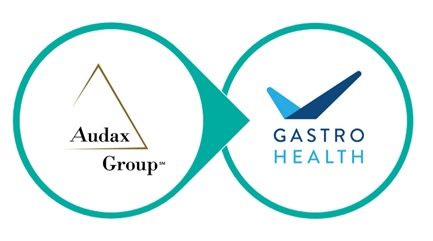 INVESTOR: AUDAX GROUP | OPERATOR: GASTRO HEALTH
INVESTOR: AUDAX GROUP | OPERATOR: GASTRO HEALTH
The Audax Group is comprised of both a private equity and a private debt fund. Audax was founded in 1999 and is headquartered in Boston, MA. The Audax Group is a leading middle market investor with over $16 billion of assets across both of their private funds. Audax’s goal is to partner with experienced management teams and financial sponsors in order to achieve long term business success. Through their buy and build approach, Audax assists platform-companies with add-on acquisitions throughout their partnership. Audax has completed 23 investments related to the healthcare industry, including dentistry, dermatology, and urology.
Gastro Health, located in Miami, FL, was founded in 2006 by the merger of GI Care Center, Gastroenterology Associates, and Gastroenterology Group. Gastro Health is a group of over 100+ leading board-certified physicians specializing in both medical and preventative treatments in the field of GI. In 2016, Gastro Health was recapitalized, beginning its partnership with Audax Group. In April 2018, Gastro entered into an agreement to acquire South Florida Gastroenterology Associates, a 15-physician practice. With this addition, Gastro Health will more than double its physical footprint in Palm Beach County.
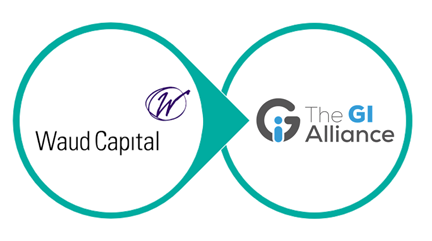
INVESTOR: WAUD CAPITAL | OPERATOR: THE GI ALLIANCE
Waud Capital is a Chicago-based PE firm. Since their founding in 1993, Waud Capital has made more than 265 investments with their current portfolio containing 35 platforms. Waud Capital has extensive experience in the healthcare industry. Acadia Healthcare, APDerm, and Ivy Rehab are few notable healthcare services platform-companies Waud Capital helped create. With nearly $3.0 billion of capital commitments since 1993, Waud Capital is prepared to continue obtaining add-on acquisitions.
The GI Alliance was initially formed through Waud Capital’s partnership with TDDC in November 2018. The GI Alliance is the largest independent GI practice in the United States operating throughout Texas and in several metropolitan markets in Louisiana. This group of established physicians aims to continue researching and harvesting new technologies in the GI field to help provide quality healthcare at their facilities. The GI Alliance is in a position to continue adding both new and experienced physicians for years to come.
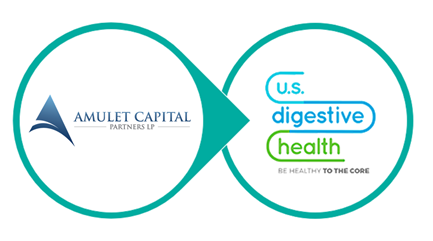
INVESTOR: AMULET CAPITAL | OPERATOR: US DIGESTIVE HEALTH
Amulet Capital is a middle-market PE investment firm stationed in Greenwich, CT, which has focused exclusively in the healthcare sector. The team at Amulet Capital has over 50 years of experience in strategic partnerships in the healthcare industry. Since their founding in 2012, Amulet Capital has pledged over $1.5 billion in healthcare investments.
US Digestive Health is a newly formed practice management services organization backed by Amulet Capital. Amulet Capital was able to form US Digestive Health through the merger of Regional GI, Digestive Disease Associates, and Mainline Gastroenterology Associates in June 2019. The consolidation of these three practices allows US Digestive Health to encompass 15 locations, 7 ASCs, and 88 providers.
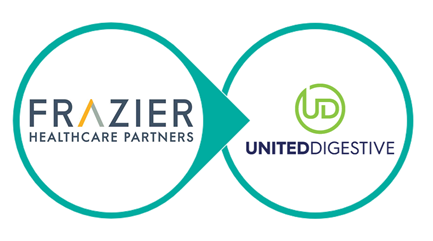
INVESTOR: FRAZIER HEALTHCARE | OPERATOR: UNITED DIGESTIVE
Frazier Healthcare Partners is a leading PE firm who has a growth buyout team specifically dedicated to investing in and developing transformational healthcare companies. Frazier was founded in 1991 and has over $2 billion invested in its portfolio. Frazier’s portfolio consists of 34 platform investments and over 100 add-on acquisitions since its founding over 20 years ago. Frazier Healthcare Partners has been involved in previous healthcare transactions including dermatology and pharmaceuticals.
United Digestive is a GI practice management company formed through Frazier Healthcare Partners’ acquisition of Atlanta Gastroenterology Associates in 2018. United Digestive provides operational infrastructure for the GI practices they manage. Atlanta Gastroenterology Associates was founded in 1976 and is one of the largest GI practices in the United States. Providing both adult and pediatric services, Atlanta Gastroenterology Associates has over 95 board-certified physicians dedicated to providing quality healthcare services.
WHO IS NEXT IN GI-FOCUSED PRIVATE EQUITY TRANSACTIONS?

OPERATOR: PEAK GASTROENTOLOGY ASSOCIATES
In March 2019, it was announced that Peak Gastroenterology Associates had retained Alkaline Advisors to provide financial advice to their team. This engagement could lead to the next big move in the GI practice transaction market. Peak Gastroenterology Associates encompasses the largest and fastest growing GI practices in southern Colorado including six primary GI locations along with 12 endoscopy centers. The presence of Peak Gastroenterology in southern Colorado presents an opportunity for PE investors to move in and consolidate in the area.5 With Peak Gastroenterology Associates publicly announcing their intent to sell, other practices throughout the southern Colorado region may also consider consolidation.
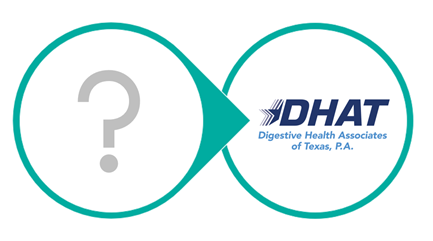
OPERATOR: DIGESTIVE HEALTH ASSOCIATES OF TEXAS
Digestive Health Associates of Texas (“DHAT”), a private GI practice, is currently exploring a sale. Based in Dallas, DHAT operates across 40 locations. DHAT was founded in 1996 when 37 physicians came together with the idea to combine their industry expertise and form the practice. For more than 20 years, DHAT has been providing state of the art GI services. It estimated that DHAT is producing $10 million in EBITDA with over 80 physicians in 2019.6
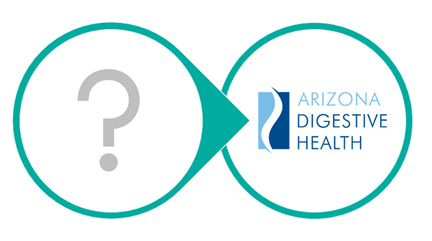
OPERATOR: ARIZONA DIGESTIVE HEALTH
Arizona Digestive Health (“ADH”) is a GI practice which has engaged an investment bank in order to pursue a sale. ADH brings together some of the most prominent names in the GI industry. With 49 gastroenterologists and three pathologists on staff, ADH specializes in GI care. ADH was formed in 2007 and now has 26 locations and 11 affiliated endoscopy centers stationed throughout Arizona. This potential transaction could mark the first consolidation of a GI practice in Arizona and encourage the start of consolidation throughout the state.
THE FUTURE OF PRIVATE EQUITY TRANSACTIONS IN GI
ADD-ON ACQUISITIONS
The GI industry is expected to see continued activity from PE firms. With only a limited number of major GI-focused PE deals taking place to date, the market has plenty of room for consolidation. While the market is still heating up and the players are preparing to deploy their funds, the firms who have already capitalized on this opportunity will be looking at tuck-in acquisitions for their platform companies. The platform companies established to date will be in an arms race to add the strongest independent practices in their respective market areas. This demand could create a competitive bidding environment for the sale for independent GI physician practices.
CONSOLIDATION
Further, as these major players solidify their place in their respective markets and continue to grow their own platforms, smaller practices are expected to merge. We expect to see small independent GI practices merge in order to more effectively compete or attract potential PE buyers. This idea was first explored in 2010 when the Illinois Gastroenterology Group was formed through the merger of four GI practices in Illinois, creating the largest GI group in the state. While a PE firm was not involved in this formation, a PE firm may seek to invest in an established GI group of this size.
HOT MARKETS
Texas has already seen this type of consolidation through Waud Capital’s formation of The GI Alliance with TDDC. It would not be surprising to see other physician practice groups follow suit in order to compete in Texas and the surrounding states before year end 2019. Additionally, in markets where platforms have already been established, further add-on acquisitions are anticipated. Platform companies will seek to roll-up smaller independent physician practices as an attempt to grow their footprint and leverage their economies of scale. With PE groups prepared to deploy capital and able to provide the resources to help these practices compete in these increasingly consolidating markets, we expect PE firms to be active in these areas.
FINAL THOUGHTS
The recent acquisitions of GI practices are at the forefront of PE activity in the healthcare industry. While all merger and acquisitions come with their share of challenges, the GI space presents an opportunity for both physician practices and PE firms to benefit from the formation of a strong strategic partnership. Through leveraging efficiencies in add-on acquisitions and developing ancillary service lines, platform companies are expected to continue generating value through their partnership with a PE firm. For GI physicians, a PE partnership can be an attractive opportunity to help ease administrative burdens and combat competitive market forces, allowing the physicians to focus on providing quality healthcare to their patients and strong returns to their investors.
References:
1. Population Reference Bureau’s Population Bulletin, December 2015
2. American Cancer Society, Key Statistics for Colorectal Cancer
3 AAMC Active Physicians in the Largest Specialties, 2017
4 HRSA Regional Projections of Supply and Demand for Internal Medicine Subspecialty Practitioners, December 2016
5 Becker’s PE groups eye Peak Gastroenterology Associates – 4 insights, March 2019
6 Founders Advisors, Recent Specialty Physician Practice Mergers and Acquisitions News, April 2019


